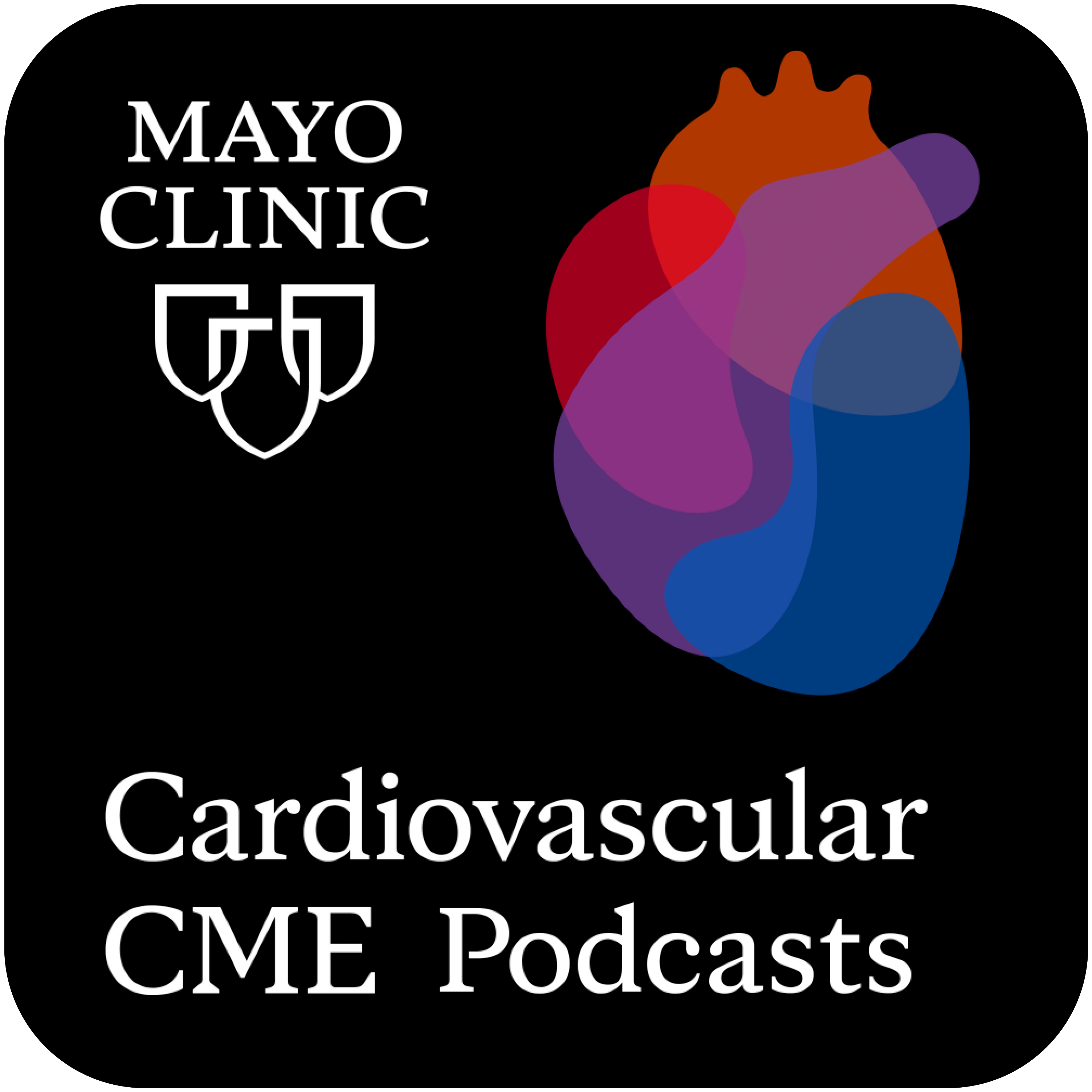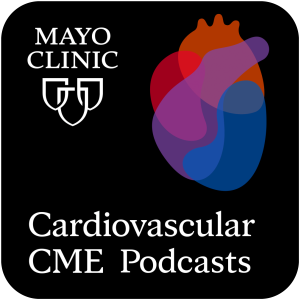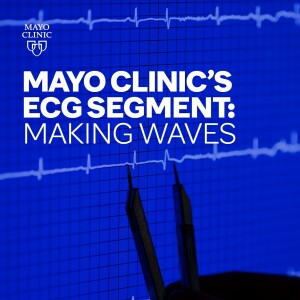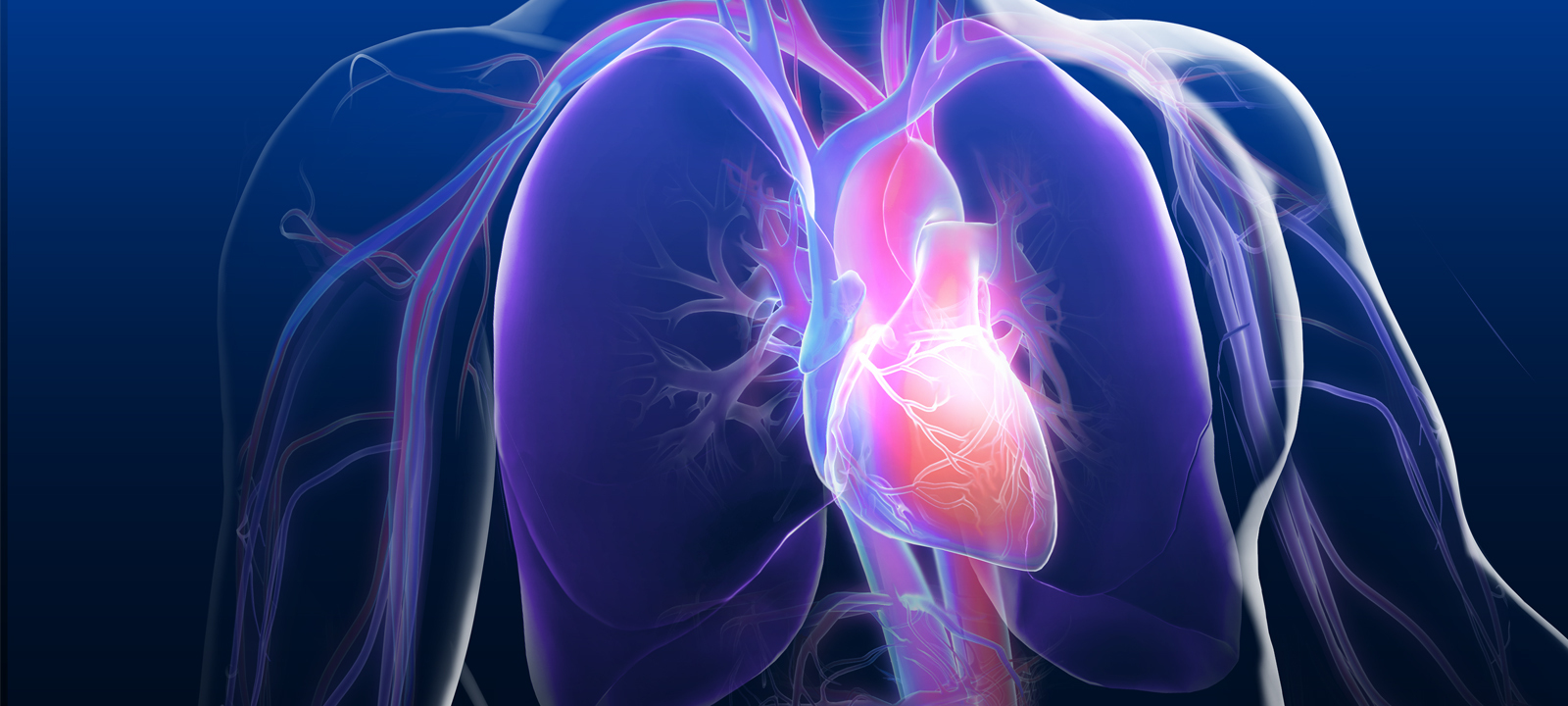
386.6K
Downloads
265
Episodes
The Cardiovascular CME podcast is a free educational offering from Mayo Clinic, featuring content geared towards physicians, physician assistants, and nurse practitioners who are interested in exploring a multitude of cardiology-related topics. Tune in and subscribe to explore today’s most pressing cardiology topics with your colleagues at Mayo Clinic and gain valuable insights that can be directly applied to your practice. No CME credit offered for podcast episodes at this time.
Episodes

Monday Jan 06, 2025
Monday Jan 06, 2025
Introduction to Dairy and Cardiovascular Health & The Science Behind Dairy and Heart Health
Guest: Maya Vadiveloo, Ph.D., RD.
Host: Kyla Lara-Breitinger, M.D.
After this podcast, listeners will understand the rationale behind low-fat dairy guidance. They will also learn about the benefits of dairy products, how to incorporate dairy if lactose intolerant, and what to look for in dairy-based alternatives. Finally, listeners will learn practical suggestions for incorporating dairy products into their diets.
Topics Discussed:
- What’s the reason/reasons behind low-fat/fat-free dairy advice?
- How can people who are lactose intolerant incorporate more dairy? Are dairy-based alternatives the same?
- How much dairy should people consume? What ways can it be incorporated healthfully?
Connect with Mayo Clinic's Cardiovascular Continuing Medical Education online at https://cveducation.mayo.edu or on Twitter @MayoClinicCV and @MayoCVservices.
LinkedIn: Mayo Clinic Cardiovascular Services
Cardiovascular Education App:
The Mayo Clinic Cardiovascular CME App is an innovative educational platform that features cardiology-focused continuing medical education wherever and whenever you need it. Use this app to access other free content and browse upcoming courses. Download it for free in Apple or Google stores today!
No CME credit offered for this episode.
Podcast episode transcript found here.

Tuesday Dec 31, 2024
Modeling Disease Pathways Through Ventricular Depolarization
Tuesday Dec 31, 2024
Tuesday Dec 31, 2024
Modeling Disease Pathways Through Ventricular Depolarization
Guest: Peter van Dam, PhD
Host: Anthony H. Kashou, MD
Detection of disease progression is hampered due to the large variation in normal QRS morphologies, even for the ECG expert. Cardiac modeling techniques can improve the interpretation and diagnostic value of the ECG by visualizing relevant QRS deviations. Comparing the QRS waveforms and electrical pathway in genetical patients to normal controls shows that even small changes in the QRS can be detected in patients with a genetical disease, like Brugada or ACM.
Topics Discussed:
- What is the PathECG?
- How do you compare PathECG to normal ECG waveform?
- What can the PathECG add to the ECG?
- Could PathECG improve the quality of the ECG diagnosis?
Connect with Mayo Clinic's Cardiovascular Continuing Medical Education online at https://cveducation.mayo.edu or on Twitter @MayoClinicCV and @MayoCVservices.
LinkedIn: Mayo Clinic Cardiovascular Services
Cardiovascular Education App:
The Mayo Clinic Cardiovascular CME App is an innovative educational platform that features cardiology-focused continuing medical education wherever and whenever you need it. Use this app to access other free content and browse upcoming courses. Download it for free in Apple or Google stores today!
No CME credit offered for this episode.
Podcast episode transcript found here.

Tuesday Dec 24, 2024
Role of Denervation for Hypertension Management
Tuesday Dec 24, 2024
Tuesday Dec 24, 2024
Role of Denervation for Hypertension Management
Guest: Sanjay Misra, M.D.
Host: Paul Friedman, M.D.
In this podcast, the listener will learn more what renal denervation is, the mechanism by which it works, how the procedure is performed, and expected outcomes for patients.
Topics Discussed:
- Ideal candidate and work up of the patient for renal denervation.
- Describe the procedure, as well as the risks and benefits.
- Follow up for patients after the procedure.
- Anticipated outcomes.
Connect with Mayo Clinic's Cardiovascular Continuing Medical Education online at https://cveducation.mayo.edu or on Twitter @MayoClinicCV and @MayoCVservices.
LinkedIn: Mayo Clinic Cardiovascular Services
Cardiovascular Education App:
The Mayo Clinic Cardiovascular CME App is an innovative educational platform that features cardiology-focused continuing medical education wherever and whenever you need it. Use this app to access other free content and browse upcoming courses. Download it for free in Apple or Google stores today!
No CME credit offered for this episode.
Podcast episode transcript found here.

Tuesday Dec 17, 2024
Chronic Thrombo-Embolic Pulmonary Hypertension
Tuesday Dec 17, 2024
Tuesday Dec 17, 2024
Chronic Thrombo-Embolic Pulmonary Hypertension
Guest: Robert P. Frantz, M.D.
Host: Kyle Klarich, M.D.
In this episode, the experts discuss chronic thrombo-embolic pulmonary hypertension. Chronic thromboembolic pulmonary hypertension results from unresolved emboli in the lungs, causing increased resistance, right heart strain, and shortness of breath. Listeners will learn more about three different treatments available, including surgery, balloons, and medication.
Topics Discussed:
- What is chronic thromboembolic pulmonary hypertension?
- What are the surgical treatments of chronic thromboembolic pulmonary hypertension?
- Are there other treatments available?
Connect with Mayo Clinic's Cardiovascular Continuing Medical Education online at https://cveducation.mayo.edu or on Twitter @MayoClinicCV and @MayoCVservices.
LinkedIn: Mayo Clinic Cardiovascular Services
Cardiovascular Education App:
The Mayo Clinic Cardiovascular CME App is an innovative educational platform that features cardiology-focused continuing medical education wherever and whenever you need it. Use this app to access other free content and browse upcoming courses. Download it for free in Apple or Google stores today!
No CME credit offered for this episode.
Podcast episode transcript found here.

Tuesday Dec 10, 2024
Arrhythmias in Pregnancy
Tuesday Dec 10, 2024
Tuesday Dec 10, 2024
Arrhythmias in Pregnancy
Guest: Katie A. Young, M.D.
Guest: Abhishek J. Deshmukh, M.B.B.S.
Host: Paul A. Friedman, M.D.
This episode dives into the complex and fascinating world of arrhythmia management during pregnancy, exploring how unique physiological changes can increase arrhythmia risk and impact treatment approaches. We’ll discuss common and high-risk arrhythmias, management strategies and the importance of a collaborative care approach involving specialists across disciplines.
Topics Discussed:
- Identify the primary risk factors and physiological changes that contribute to arrhythmias in pregnant patients.
- Describe evidence-based management strategies for common and high-risk arrhythmias during pregnancy, including considerations for medication and procedural interventions.
- Recognize the role of interdisciplinary care in managing arrhythmias in pregnancy to ensure optimal maternal and fetal outcomes.
Connect with Mayo Clinic's Cardiovascular Continuing Medical Education online at https://cveducation.mayo.edu or on Twitter @MayoClinicCV and @MayoCVservices.
LinkedIn: Mayo Clinic Cardiovascular Services
Cardiovascular Education App:
The Mayo Clinic Cardiovascular CME App is an innovative educational platform that features cardiology-focused continuing medical education wherever and whenever you need it. Use this app to access other free content and browse upcoming courses. Download it for free in Apple or Google stores today!
No CME credit offered for this episode.
Podcast episode transcript found here.

Tuesday Dec 03, 2024
AI ECG Updates
Tuesday Dec 03, 2024
Tuesday Dec 03, 2024
AI ECG Updates
Guest: Francisco Lopez-Jimenez, M.D., M.S.
Host: Anthony H. Kashou, M.D.
There have been many recent developments regarding AI-ECG, with some algorithms able to identify common and very relevant medical conditions like CAD and diastolic disfunction. There are major limitations implementing AI-ECG, including regulatory, technical and clinician-related. Algorithms meant to detect rare diseases, when used indiscriminately, may lead to many false positive results. The future of AI-ECG is optimizing its implementation through seamless integration in workflows, use of point of care or wearables getting ECG signals, and using multimodality AI, where AI-ECG would be just one of several signals used to detect cardiac and non-cardiac conditions, aging, and to predict cardiovascular events.
Topics Discussed:
- What is new on AI ECG these days? What new algorithms have been developed that you see may change clinical practice in the future? (although structured as 2 questions, its actually one)
- What are the major limitations using AI-ECG in clinical practice?
- What do you think is the future of AI-ECG?
Connect with Mayo Clinic's Cardiovascular Continuing Medical Education online at https://cveducation.mayo.edu or on Twitter @MayoClinicCV and @MayoCVservices.
LinkedIn: Mayo Clinic Cardiovascular Services
Cardiovascular Education App:
The Mayo Clinic Cardiovascular CME App is an innovative educational platform that features cardiology-focused continuing medical education wherever and whenever you need it. Use this app to access other free content and browse upcoming courses. Download it for free in Apple or Google stores today!
No CME credit offered for this episode.
Podcast episode transcript found here.

Tuesday Nov 26, 2024
Optimal Medical Therapy in Peripheral Artery Disease
Tuesday Nov 26, 2024
Tuesday Nov 26, 2024
Optimal Medical Therapy in Peripheral Artery Disease
Guest: Stan Henkin, M.D.
Host: Malcolm R. Bell, M.D.
Atherosclerosis of peripheral (ie, non-coronary) arteries, also known as peripheral artery disease (PAD), affects more than 8 million Americans. Unfortunately, compared to coronary artery disease (CAD), PAD is often underdiagnosed and undertreated. In this podcast, experts discuss optimal medical therapy in patients with PAD.
Topics Discussed:
- What is peripheral artery disease? What are the most common symptoms of PAD?
- You diagnose PAD. What pharmacologic and non-pharmacologic therapies do you consider?
- How do you follow-up a patient with PAD?
- When should a patient be referred to a vascular specialist?
Connect with Mayo Clinic's Cardiovascular Continuing Medical Education online at https://cveducation.mayo.edu or on Twitter @MayoClinicCV and @MayoCVservices.
LinkedIn: Mayo Clinic Cardiovascular Services
Cardiovascular Education App:
The Mayo Clinic Cardiovascular CME App is an innovative educational platform that features cardiology-focused continuing medical education wherever and whenever you need it. Use this app to access other free content and browse upcoming courses. Download it for free in Apple or Google stores today!
No CME credit offered for this episode.
Podcast episode transcript found here.

Tuesday Nov 19, 2024
Dyspnea After Pulmonary Embolism
Tuesday Nov 19, 2024
Tuesday Nov 19, 2024
Dyspnea After Pulmonary Embolism: Optimal Medical Therapy in Peripheral Vascular Disease
Guest: Stan Henkin, M.D.
Host: Malcolm R. Bell, M.D.
Historically, majority of clinical and research focus has been on acute management of pulmonary embolism (PE). However, long-standing functional impairment after PE is common, occurring in up to 50% of individuals with history of PE. This is termed post-PE syndrome – an underrecognized, underdiagnosed, and undertreated entity. In this podcast, experts discuss epidemiology, pathophysiology, diagnosis, and treatment of post-PE syndrome.
Topics Discussed:
- What is Post-PE syndrome? How common is it?
- What is your suggested work-up of patient who presents with dyspnea after PE?
- When should a patient be referred to a tertiary/expert center?
Connect with Mayo Clinic's Cardiovascular Continuing Medical Education online at https://cveducation.mayo.edu or on Twitter @MayoClinicCV and @MayoCVservices.
LinkedIn: Mayo Clinic Cardiovascular Services
Cardiovascular Education App:
The Mayo Clinic Cardiovascular CME App is an innovative educational platform that features cardiology-focused continuing medical education wherever and whenever you need it. Use this app to access other free content and browse upcoming courses. Download it for free in Apple or Google stores today!
No CME credit offered for this episode.
Podcast episode transcript found here.

Tuesday Nov 12, 2024
MINOCA: Myocardial Infarction with Non-Obstructive Coronary Arteries
Tuesday Nov 12, 2024
Tuesday Nov 12, 2024
MINOCA: Myocardial Infarction with Non-Obstructive Coronary Arteries
Guest: Claire E. Raphael, M.B.B.S., Ph.D.
Host: Sharonne Hayes, M.D.
MINOCA is a myocardial infarction with no obstructive coronary artery disease. This podcast will discuss the underlying causes of MINOCA, how to and who to investigate and discuss contemporary management strategies.
Topics Discussed:
- What is MINOCA?
- What testing should I consider in patients with MINOCA
- How are these patients treated?
Connect with Mayo Clinic's Cardiovascular Continuing Medical Education online at https://cveducation.mayo.edu or on Twitter @MayoClinicCV and @MayoCVservices.
LinkedIn: Mayo Clinic Cardiovascular Services
Cardiovascular Education App:
The Mayo Clinic Cardiovascular CME App is an innovative educational platform that features cardiology-focused continuing medical education wherever and whenever you need it. Use this app to access other free content and browse upcoming courses. Download it for free in Apple or Google stores today!
No CME credit offered for this episode.
Podcast episode transcript found here.

Tuesday Nov 05, 2024
An AI-ECG Algorithm for Left Ventricular Diastolic Dysfunction
Tuesday Nov 05, 2024
Tuesday Nov 05, 2024
An AI-ECG Algorithm for Left Ventricular Diastolic Dysfunction
Guest: Jae Oh, M.D.
Host: Anthony H. Kashou, M.D.
Diastolic function assessment is crucial in diagnosing, managing, and predicting outcomes in various cardiac conditions. It provides insight into heart health, particularly in diagnosing heart failure. Shortness of breath, a common patient complaint, often indicates elevated diastolic filling pressure if linked to a cardiac condition. Echocardiography is the primary method for assessing diastolic function, but it is operator-dependent and not always available. In contrast, ECGs are standardized and widely accessible. Although subtle changes in ECGs are not easily detectable by the human eye, artificial intelligence can identify specific conditions reflected in the ECG. By training an AI model with labeled ECGs based on diastolic function determined through echocardiography, researchers achieved high accuracy in detecting diastolic dysfunction. AI-enhanced ECGs can significantly impact the identification of both asymptomatic and symptomatic cardiac conditions, potentially streamlining diagnostic strategies and reducing costs. Future developments may enable patients to monitor their heart health using simple wearable devices, enhancing the management of heart failure and other conditions.
Topics Discussed:
- Your special clinical academic interest is echocardiography. Why are you interested in ECG AI in diastolic function?
- What is diastolic function and why is it important to assess diastolic function in clinical practice?
- Why did you decide to create AI-ECG for diastolic function assessment?
- What did you find and how do you envision AI ECG for diastolic function be used in clinical practice?
Connect with Mayo Clinic's Cardiovascular Continuing Medical Education online at https://cveducation.mayo.edu or on Twitter @MayoClinicCV and @MayoCVservices.
LinkedIn: Mayo Clinic Cardiovascular Services
Cardiovascular Education App:
The Mayo Clinic Cardiovascular CME App is an innovative educational platform that features cardiology-focused continuing medical education wherever and whenever you need it. Use this app to access other free content and browse upcoming courses. Download it for free in Apple or Google stores today!
No CME credit offered for this episode.
Podcast episode transcript found here.
